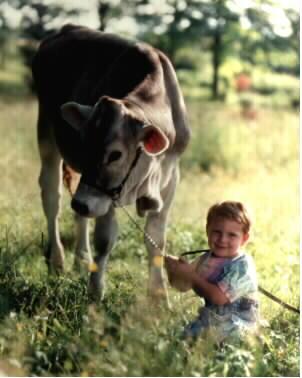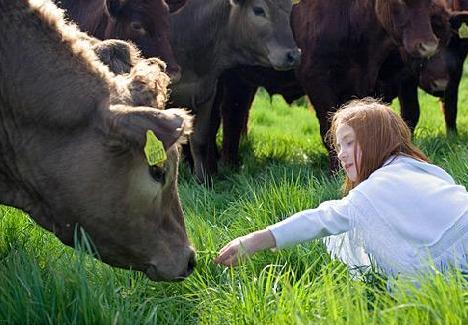Why Choose a Vegetarian Diet?
There are several common reasons given for being vegetarian but the main point is; compassion for other living creatures. The main purpose of meat in the diet is to provide protein. Today, in the environment of the modern grocery store, there are many alternatives that can also provide adequate protein. If meat is optional, then why get involved in the business of raising animals for slaughter? Man throughout history has developed close relationships with various animals; cats, dogs and other pets, horses, dairy cows etc. It can be seen that animals have intelligence, express feelings and suffer when experiencing pain. It is our natural tendency to care for and appreciate animals. It is not in our natural tendency to kill or be cruel. Most people, if given a knife, would be incapable of killing an animal or bird. They would be horrified to watch it. It is only through conditioning and repetition that some people can become accustom to committing cruel acts without being affected. It is not our inherent nature. The slaughterhouses and killing are kept from the public view. We only see the neat little packages in the grocery store cooler. Buying meat is in effect paying someone else to do the killing for us.
 As mentioned in the article on man's Natural Diet, each species has instincts that draw them to the foods that are right for them. Their natural foods are very appealing to the sight, smell and taste. People find the sight of fresh fruits and vegetables very attractive. The smell of freshly baked bread is always very enticing. A carnivore is very attracted to the sight of a dead animal and is drawn to eat it raw, blood and all. People cannot stand the sight or smell of a dead animal and would never be attracted to eat a carcass as is. After one has lived on a vegetarian diet for some time, meat is not missed at all, in fact the sight and smell of it becomes very unpleasant.
As mentioned in the article on man's Natural Diet, each species has instincts that draw them to the foods that are right for them. Their natural foods are very appealing to the sight, smell and taste. People find the sight of fresh fruits and vegetables very attractive. The smell of freshly baked bread is always very enticing. A carnivore is very attracted to the sight of a dead animal and is drawn to eat it raw, blood and all. People cannot stand the sight or smell of a dead animal and would never be attracted to eat a carcass as is. After one has lived on a vegetarian diet for some time, meat is not missed at all, in fact the sight and smell of it becomes very unpleasant.
The second main reason for vegetarianism is health. Not only is meat unnatural to humans, consuming it increases the risk of various chronic diseases. Studies have shown an association with the amount of meat consumed by a given population and the incidence of bowel cancer. Countries with higher meat consumption have a much higher incidence of bowel cancer than countries with low meat consumption. Meat also comes with saturated fat. High levels of saturated fat in the diet have been shown to increase heart disease. Meat and fish, being higher on the food chain, have higher levels of contaminants (pesticides, DDT, PCB's, heavy metals, mercury etc.) than plant foods. If you do eat meat, nutritionists will recommend to limit the red meat (beef and pork) and eat more poultry (without the skin) and fish. However, meat and fish are not necessary at all. It is now widely accepted in nutritional science, that one can remain completely healthy on a vegetarian diet throughout all stages of life from infancy to old age. Position of the American Dietetic Association Vegetarians have less heart disease, obesity, hypertension, diabetes and live longer than non-vegetarians. Health Benefits of Vegetarian Diets
Another reason for a vegetarian lifestyle is the impact to our environment and the world food supply. See The Impact of Industrialized Animal Agriculture on the Environment for more information. It takes 10 to 16 pounds of grain to produce 1 pound of beef. More than half of the grain produced in the U.S. is fed to livestock. The acreage used to grow cattle feed could be used to grow grains for human consumption. This would dramatically increase the world food supply. "If all the grain currently fed to livestock in the United States were consumed directly by people, the number of people who could be fed would be nearly 800 million" Cornell University - Science News For more information, refer to Diet For a Small Planet by Frances Moore Lappe.
 Some practice vegetarianism for religious reasons. Hindus, Buddhists, Jains and Seventh Day Adventists commonly take a vegetarian diet. The underlying reason generally evolves from a principle of respect for life or ahimsa, non-violence. Ahimsa can be translated as harmlessness, which means one should strive not to harm or cause suffering to another. Ahimsa can also be translated as "absence of ill will" or stated in a positive way, one should strive for love and compassion toward others. Many people have a hard enough time learning compassion for other people let alone animals! But as we and society evolves, so does our conscience. In some cases, killing may be necessary for the safety or survival of oneself or others. But it should only be resorted to out of necessity and done without feeling of ill will. Killing animals for food in today's society is not a necessity.
Some practice vegetarianism for religious reasons. Hindus, Buddhists, Jains and Seventh Day Adventists commonly take a vegetarian diet. The underlying reason generally evolves from a principle of respect for life or ahimsa, non-violence. Ahimsa can be translated as harmlessness, which means one should strive not to harm or cause suffering to another. Ahimsa can also be translated as "absence of ill will" or stated in a positive way, one should strive for love and compassion toward others. Many people have a hard enough time learning compassion for other people let alone animals! But as we and society evolves, so does our conscience. In some cases, killing may be necessary for the safety or survival of oneself or others. But it should only be resorted to out of necessity and done without feeling of ill will. Killing animals for food in today's society is not a necessity.
For the most part, people eat a diet according to their cultural upbringing. We develop a taste for Mom's cooking, then certain habits take hold and usually the same menu passes from generation to generation. For example; in Japan, a typical meal may be rice and fish, in Mexico, tortilla, meat and beans, and in the U.S. meat, potato and vegetable is standard fare. Often there is little thought about the health impact or our nutritional requirements and how they can best be met. If a healthy diet is not typical in one's local environment, there will be a need to break from habit and make a conscious choice to start eating in a healthier and more compassionate way. A healthy diet includes abundant fruits, vegetables, whole grains and in moderation legumes, nuts and optionally low-fat dairy.

View Comments(1) Post a Comment